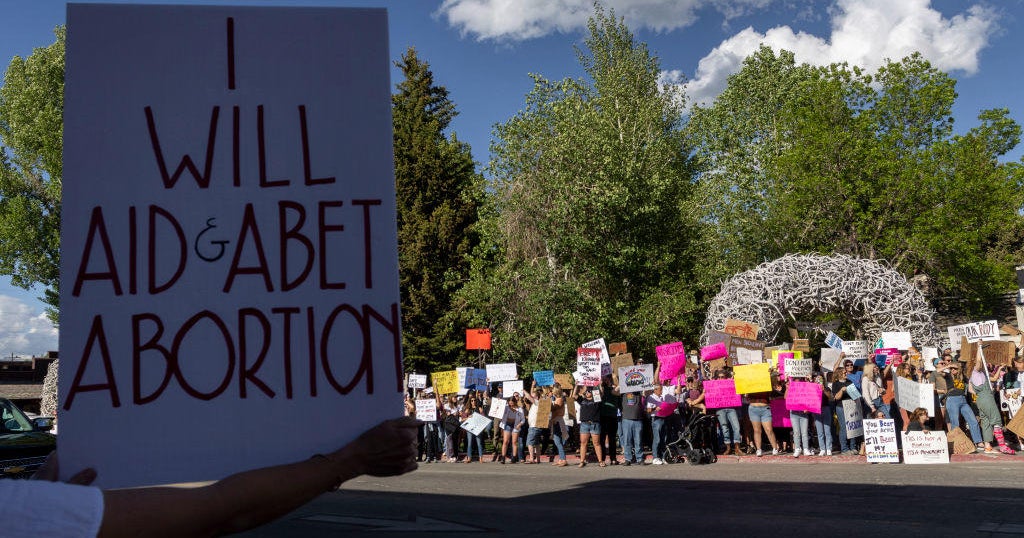Mississippi asks Supreme Court again to review its 15-week abortion ban
Update, October 29, 2020: The Supreme Court announced it was postponing its Friday conference to review Mississippi's petition for the court to hear the case. A new date has not yet been set.
The Mississippi attorney general petitioned the Supreme Court again on Thursday, October 22, to review the state's 15-week abortion ban, a case that directly challenges Roe v. Wade and has the potential to reverse the landmark 1973 decision. The request came just hours after Republicans on the Senate Judiciary Committee voted to approve Amy Coney Barrett's nomination to the high court. The full Senate voted to confirm her on Monday.
In the seven-page supplemental brief, Mississippi Attorney General Lynn Fitch pointed to separate abortion-related cases where federal appeals court judges have extracted different interpretations of the Supreme Court's decision in June Medical Services v. Russo — the court's most recent abortion case which struck down a Louisiana abortion regulation. While some courts have cited the majority opinion to block other abortion restrictions, others have instead used Chief Justice John Roberts' concurrence to rule in favor of regulations that hinder abortion access.
Fitch noted that hearing Mississippi's defense of its 15-week abortion ban would give the Supreme Court an opportunity to clarify how lower courts should interpret its precedent.
"This case remains an ideal vehicle to promptly resolve both that question and the first question presented—the contradictions in this Court's decisions over use of 'viability' as a bright line for measuring pro-life legislation," Fitch wrote.
In Fitch's initial July request that the Supreme Court review the 15-week ban, he posed the question of "whether all pre-viability prohibitions on elective abortions are unconstitutional," a direct challenge to the core finding of Roe v. Wade, the 1973 Supreme Court case that nationally legalized abortion prior to fetal viability, which generally happens around 24 weeks into a pregnancy.
"Mississippi's 15-week abortion ban defies nearly fifty years of Supreme Court precedent," said Hillary Schneller, the staff attorney at the Center for Reproductive Rights challenging the state law, in an email to CBS News. "Mississippi's abortion ban, by definition, is a complete and insurmountable obstacle for pregnant people seeking abortion care after 15 weeks."
In a supplemental brief filed Monday, attorneys representing Mississippi's only abortion provider disputed the state's argument, writing that disagreements over the constitutionality of abortion regulations weren't related to Mississippi's 15-week ban.
"The circuit courts are unanimous as to the only question raised by this case — whether a pre-viability abortion ban is unconstitutional," attorneys for the Center for Reproductive Rights wrote. "There is thus no 'burgeoning split of authority' that would or even could alter the outcome here."
On behalf of Jackson Women's Health Organization, the attorneys requested the Supreme Court decline to hear the case.
Mississippi's petition came just ahead of the confirmation of Amy Coney Barrett to the Supreme Court, giving the high court a 6-3 conservative majority and clouding the future of abortion access.
During her confirmation hearings, Barrett declined to answer the many questions senators posed to her about Roe v. Wade, explaining to California Senator Dianne Feinstein, "If I express a view on a precedent one way or another, whether I say I love it or I hate it, it signals to litigants that I might tilt one way or another on a pending case."
But in years past, Barrett had signed her name to ads opposing abortion and was a member of University Faculty for Life at Notre Dame.
It's impossible to predict which cases the Supreme Court will ultimately decide to hear. It takes four justices to agree to take up a case. Typically, the court will only consider getting involved if lower courts have disagreed, as Fitch noted they have done in interpreting the decision in June Medical.
The court has rescheduled consideration of whether to take up Mississippi's ban three times already since the state initially requested the Supreme Court to intervene in June. Last December a federal appeals judge struck down the state's ban, writing, "In an unbroken line dating to Roe v. Wade, the Supreme Court's abortion cases have established (and affirmed, and re-affirmed) a woman's right to choose an abortion before viability… States may regulate abortion procedures prior to viability so long as they do not impose an undue burden on the woman's right but they may not ban abortions."
Mississippi's abortion ban is one of two abortion-related cases that are currently awaiting the court's decision on whether to hear them. If the Supreme Court declines to hear those, another 17 are just one step away.



